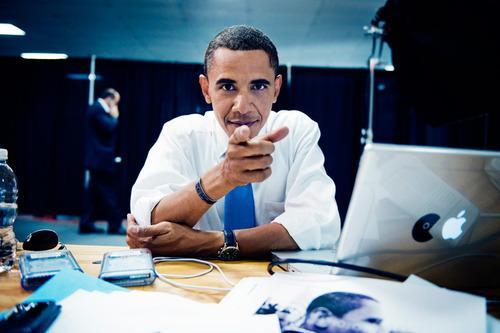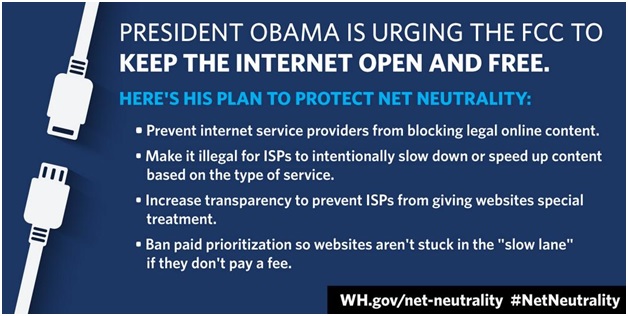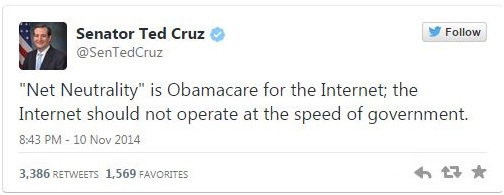
Written by: Anon.Dos
President Barak Obama made an announcement on Monday 10th of November requesting the Federal Communications Commission to reconsider or reclassify consumer internet services. To be specific the consumer internet services or consumer broadband services under title 2 (1996) telecommunications act that was passed by the Congress and later signed by the former president Bill Clinton on 8th of February of 1996; it was simply an agenda to encourage lower prices and easy rules and laws and to provide better services to the people of the United States.
Here is the President’s Statement for you to decide:
An open Internet is essential to the American economy, and increasingly to our very way of life. By lowering the cost of launching a new idea, igniting new political movements, and bringing communities closer together, it has been one of the most significant democratizing influences the world has ever known.
“Net neutrality” has been built into the fabric of the Internet since its creation — but it is also a principle that we cannot take for granted. We cannot allow Internet service providers (ISPs) to restrict the best access or to pick winners and losers in the online marketplace for services and ideas. That is why today, I am asking the Federal Communications Commission (FCC) to answer the call of almost 4 million public comments, and implement the strongest possible rules to protect net neutrality.
When I was a candidate for this office, I made clear my commitment to a free and open Internet, and my commitment remains as strong as ever. Four years ago, the FCC tried to implement rules that would protect net neutrality with little to no impact on the telecommunications companies that make important investments in our economy. After the rules were challenged, the court reviewing the rules agreed with the FCC that net neutrality was essential for preserving an environment that encourages new investment in the network, new online services and content, and everything else that makes up the Internet as we now know it. Unfortunately, the court ultimately struck down the rules — not because it disagreed with the need to protect net neutrality, but because it believed the FCC had taken the wrong legal approach.
The FCC is an independent agency, and ultimately this decision is theirs alone. I believe the FCC should create a new set of rules protecting net neutrality and ensuring that neither the cable company nor the phone company will be able to act as a gatekeeper, restricting what you can do or see online. The rules I am asking for are simple, common-sense steps that reflect the Internet you and I use every day, and that some ISPs already observe. These bright-line rules include:
- No blocking. If a consumer requests access to a website or service, and the content is legal, your ISP should not be permitted to block it. That way, every player — not just those commercially affiliated with an ISP — gets a fair shot at your business.
- No throttling. Nor should ISPs be able to intentionally slow down some content or speed up others — through a process often called “throttling” — based on the type of service or your ISP’s preferences.
- Increased transparency. The connection between consumers and ISPs — the so-called “last mile” — is not the only place some sites might get special treatment. So, I am also asking the FCC to make full use of the transparency authorities the court recently upheld, and if necessary to apply net neutrality rules to points of interconnection between the ISP and the rest of the Internet.
- No paid prioritization. Simply put: No service should be stuck in a “slow lane” because it does not pay a fee. That kind of gate keeping would undermine the level playing field essential to the Internet’s growth. So, as I have before, I am asking for an explicit ban on paid prioritization and any other restriction that has a similar effect.
If carefully designed, these rules should not create any undue burden for ISPs, and can have clear, monitored exceptions for reasonable network management and for specialized services such as dedicated, mission-critical networks serving a hospital. But combined, these rules mean everything for preserving the Internet’s openness.
The rules also have to reflect the way people use the Internet today, which increasingly means on a mobile device. I believe the FCC should make these rules fully applicable to mobile broadband as well, while recognizing the special challenges that come with managing wireless networks.
To be current, these rules must also build on the lessons of the past. For almost a century, our law has recognized that companies who connect you to the world have special obligations not to exploit the monopoly they enjoy over access in and out of your home or business. That is why a phone call from a customer of one Phone Company can reliably reach a customer of a different one, and why you will not be penalized solely for calling someone who is using another provider. It is common sense that the same philosophy should guide any service that is based on the transmission of information — whether a phone call, or a packet of data.
So the time has come for the FCC to recognize that broadband service is of the same importance and must carry the same obligations as so many of the other vital services do. To do that, I believe the FCC should reclassify consumer broadband service under Title II of the Telecommunications Act — while at the same time forbearing from rate regulation and other provisions less relevant to broadband services. This is a basic acknowledgment of the services ISPs provide to American homes and businesses, and the straightforward obligations necessary to ensure the network works for everyone — not just one or two companies.
Investment in wired and wireless networks has supported jobs and made America the center of a vibrant ecosystem of digital devices, apps, and platforms that fuel growth and expand opportunity. Importantly, network investment remained strong under the previous net neutrality regime, before it was struck down by the court; in fact, the court agreed that protecting net neutrality helps foster more investment and innovation. If the FCC appropriately forbears from the Title II regulations that are not needed to implement the principles above — principles that most ISPs have followed for years — it will help ensure new rules are consistent with incentives for further investment in the infrastructure of the Internet.
The Internet has been one of the greatest gifts our economy — and our society — has ever known. The FCC was chartered to promote competition, innovation, and investment in our networks. In service of that mission, there is no higher calling than protecting an open, accessible, and free Internet. I thank the Commissioners for having served this cause with distinction and integrity, and I respectfully ask them to adopt the policies I have outlined here, to preserve this technology’s promise for today, and future generations to come.
However, while free internet is a good thing in its own way, it can allow the government to have its complete control and monitor all the activity – good bye privacy & freedom of speech – since they will be providing us free services. In a statement regarding free and open internet, Federal Communications Commission answered to a frequently asked question: Does the Federal Communications Commission regulate internet content or applications? The answer in response to the question is a simple no. They further state that FCC wants to develop and impose simple and easy rules for broad band to ensure that neither the companies nor the government can stop progress over the internet. 
President Obama’s Plan to Protect Net Neutrality
Big names from telecommunications giants are not happy about it, one of them – who would like to remain anonymous for obvious reasons – states that this is the 1st step in censorship in this field. He reminded that this is how England started and slowly took control of the net content. He further states that Federal Communications Commission already controls broad cast stations on the TV & radio. He also gave an example by saying that they already don’t have the complete control of the language content; everything that is aired must go through strict rules of regulations and compliance.
Professor Laurence H. Winer of Law from Arizona State University says that net neutrality is rather a complicated approach. The President’s proposal was simply a bad decision since it will allow the Federal Communications Commission far too much power over the main means of communications. He further added that anyone with the right knowledge of history of mass media broadcasting and a like should not be happy of having the government or even an independent agency developing such regulations. 
Senator Ted Cruz Tweets on Net Neutrality
Professor Winer had one last cautionary piece of advice for the general public, he said that we should research and be aware for it would give FCC and any future agency like the FCC under a different administration broad powers over an extremely important and reliable source of communications because we have seen it in other countries where the government can abuse that regulatory power because people do not understand when they say, ‘Net neutrality, Hooray! Free internet for us.’ This hooray free internet for us will give the government the power to regulate the key medium.
Telecommunications is a means and is one of the backbones of today’s world. The aim should not be to figure out regulatory policies and create competitive market for internet access but a non monitory internet environment where people can freely exchange information and a place of innovation.
__________________________________________________________________________
Source:
http://en.wikipedia.org/wiki/Net_neutrality
http://techcrunch.com/2014/11/28/a-world-without-net-neutrality-already-exists/
http://www.whitehouse.gov/net-neutrality
http://www.fcc.gov/guides/open-internet
http://transition.fcc.gov/Reports/1934new.pdf





Ted Cruz… Any jakanapes can have an opinion but this moron is more irritating than most.
IMHO, as things stand, I put more trust in government than I do large corporations. If we break up the giants first to create competition, well, then, maybe.
OMG! Obama is for something, better be against it!
I mean, it’s not like anonymous wasn’t against Net Neutrality before… Right?
Bunch of hypocrite assholes.
bitch get of here anonymous tracks ever users ip dum ass so watch your monty asss bitch fuck you i got youre ip bitch i will pic a time to ddos you ok so stu the fuck up bitch kid by a latop with 1mhps intrenet
I think the whole idea of net neutrality is a good one. And should be in play as to keep companies like comcast,atnt, time warrner from raping john q public just to get online. But i also believe to put the U.S. government in charge of such a task would be a crime to the people of the U.S.
You see how the U.S. government abuses the power it has over anything it touches. Just ask any native american indian or any japanese americans who lived thru WW2 in this country.
Next they will be hunting down bible believing christians to pop us in there mystery ovens…
Be blessed and be safe
Fuck you Obama